TRR404 @ Long Night of Science Dresden
In 2025, Dresden's research institutions will once again be the stage for exciting experiments, surprising “aha” moments and clever questions. On June 20, 2025, the Long Night of Science Dresden (LNdW) will once again invite thousands of visitors to experience science up close - this time under the motto: “The night that makes you smarter”
Our local members of #TRR404, of course, will be part of it! There will be 3 stations where research topics from the TRR #Active3D can be experienced. So, if you are there - feel invited!
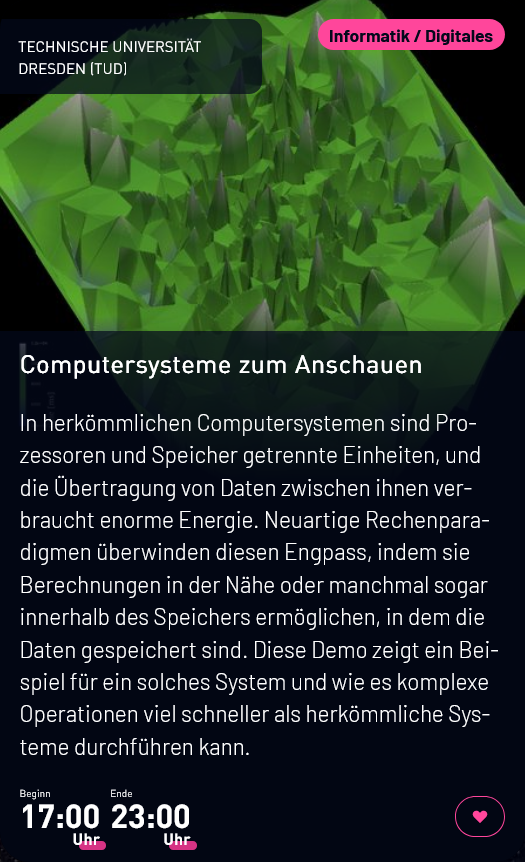
In herkömmlichen Computersystemen sind Prozessoren und Speicher getrennte Einheiten, und die Übertragung von Daten zwischen ihnen verbraucht enorme Energie. Neuartige Rechenparadigmen überwinden diesen Engpass, indem sie Berechnungen in der Nähe oder manchmal sogar innerhalb des Speichers ermöglichen, in dem die Daten gespeichert sind. Diese Demo zeigt ein Beispiel für ein solches System und wie es komplexe Operationen viel schneller als herkömmliche Systeme durchführen kann.
cfaed, Professur für Compilerbau / TRR404 - Sonderforschungsbereich Transregio "Active-3D"
Barkhausen-Bau
Eingangsfoyer Barkhausenteich
Helmholtzstraße 18/ Georg-Schumann-Straße 11
01069 Dresden (Dresdner Süden)
https://www.wissenschaftsnacht-dresden.de/programm/detailansicht/computersysteme-zum-anschauen-14541
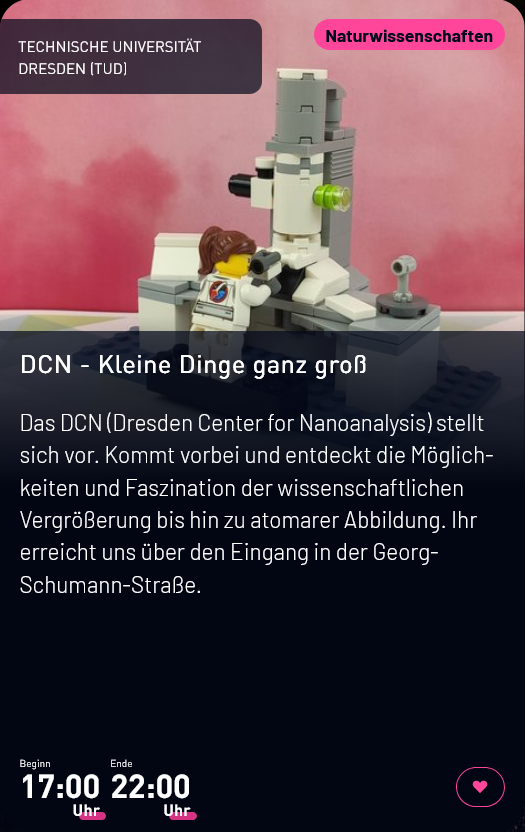
Das DCN (Dresden Center for Nanoanalysis) stellt sich vor. Kommt vorbei und entdeckt die Möglichkeiten und Faszination der wissenschaftlichen Vergrößerung bis hin zu atomarer Abbildung. Ihr erreicht uns über den Eingang in der Georg-Schumann-Straße.
Beobachtet spannende Untersuchungen am Mikroskop! Kleine Dinge ganz groß – ob Ameise oder moderner Computerchip, Obstfliege oder Pollenstaub, all diese kleinen Dinge können am DCN mithilfe von modernen Mikroskopen ganz nah und groß betrachtet werden.
cfaed, Dresden Center for Nanoanalysis (DCN)
Barkhausen-Bau
Sockelgeschoss: S81
Helmholtzstraße 18/ Georg-Schumann-Straße 11
01069 Dresden (Dresdner Süden)
https://www.wissenschaftsnacht-dresden.de/programm/detailansicht/dcn-kleine-dinge-ganz-gross-13923
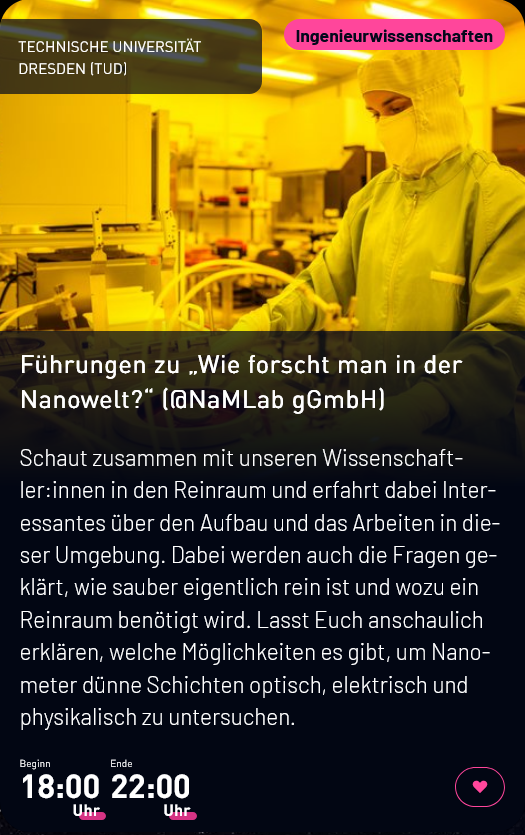
Schaut zusammen mit unseren Wissenschaftler:innen in den Reinraum und erfahrt dabei Interessantes über den Aufbau und das Arbeiten in dieser Umgebung. Dabei werden auch die Fragen geklärt, wie sauber eigentlich rein ist und wozu ein Reinraum benötigt wird. Lasst Euch anschaulich erklären, welche Möglichkeiten es gibt, um Nanometer dünne Schichten optisch, elektrisch und physikalisch zu untersuchen.
Technische Universität Dresden (TUD)
NaMLab - Nanoelectronic Materials Laboratory / Sonderforschungsbereich/Transregio "active-3D"
Nöthnitzer Straße 64a
01187 Dresden (Dresdner Süden)
30 Min
TRR404 Guest Talk "Harnessing Structural Disorder: Multilayer 2D Amorphous Carbon in Next-Generation Microelectronics"
Guest: Theodore von Kármán Fellow Prof. Barbaros Oezyilmaz, National University of Singapore
Talk: “Harnessing Structural Disorder: Multilayer 2D Amorphous Carbon in Next-Generation Microelectronics”
Date: 6 June 2025
Time: 11:00 am
Location: RWTH Aachen, Sommerfeldstr. 18, WSH S1 (4243|104)
Online: https://rwth.zoom-x.de/j/64415994376?pwd=EgBrb5S975fpBKqKQGW85YeKcxvbw0.1
Bio: Materials Science and Engineering Department, Physics Department, Centre for Advanced Materials (CA2DM), Institute for Functional Intelligent Materials (I-FIM), National University of Singapore
https://graphene.nus.edu.sg/barbaros/
Abstract: Unlike defective materials, amorphous materials are heavily disordered yet can be structurally stable. This allows the observation of unusual electronic states and reshapes their energy-momentum dispersion [1]. Furthermore, their heavily disordered atomic potential can drastically alter the local density of states (LDOS). In this context, I will discuss Multilayer Amorphous Carbon (MLAC). It’s freestanding, corrugated 2D nature challenges the conventional Bloch-state framework, enabling new perspectives on 2D Anderson insulator physics and multifractal electronic states. Its fundamental properties help address a number of challenges especially in the microelectronics industry. For example, ML-AC uniquely achieves a high degree of disorder without sacrificing structural integrity. This overcomes typical leakage issues of Anderson insulators under bias relevant for low power electronics. Utilizing non-polar carbon-carbon bonding and suppressing electronic polarization through disorder enables access to ultra-low-k insulating properties (k~1.35). Such a low dielectric constant has the potential to address the RC delay bottleneck in interconnect scaling for advanced CMOS, offering a viable alternative to conventional dielectrics such as SiCOOH. I will conclude with recent results on volatile switching in graphene–MAC–graphene heterostructures, positioning MAC as a potential selector or neuron element in neuromorphic architectures.
1. Toh, C.-T. et al. Synthesis and properties of free-standing monolayer amorphous carbon. Nature 577, 199–203 (2020).
TRR404 Guest Talk "Anisotropic Magneto-Transport and Magneto-Thermopower Response of Crystalline Magnetic Films"
Guest: Prof. Dr. Sebastian T. B. Goennenwein, University of Konstanz
Talk: “Anisotropic Magneto-Transport and Magneto-Thermopower Response of Crystalline Magnetic Films”
Date: 18 June 2025
Time: 1:00 pm
Location: TU Dresden, Barkhausen-Bau, Room BAR E64A
Online: upon request (trr404@tu-dresden.de)
Bio: Sebastian T. B. Goennenwein graduated from TechnischeUniversität München (Germany) with a PhD in physics in 2003. Following a postdoc at TU Delft (The Netherlands), he worked as a research group leader and deputy director at Walther-Meissner-Institut, Bavarian Academy of Sciences, Germany. In 2016, Sebastian Goennenwein was appointed full professor at the Faculty of Physics, TechnischeUniversität Dresden. In 2020, he followed a call to a full professor position at the Physics Department of the University of Konstanz. His research addresses spin currents, spin dynamics, spin caloritronics, spin fluctuations as well as topology-related phenomena in multi-functional magnetic heterostructures and devices.
Abstract: The magneto-transport response of magnetically ordered materials –such as the anisotropic magneto-resistance (AMR), or the anomalous Hall effect (AHE) –has been extensively studied in the last decades. While the magneto-transport response of amorphous or polycrystalline samples often can be described by comparatively simple expressions, the implications of crystal symmetry lead to a much richer and more complex response in single-crystalline specimens [1]. In particular, higher-order terms with a seemingly “unconventional” dependence on the magnetization can be allowed by symmetry, and indeed also be detected in experiment [2]. In the presentation, I will first review the implications imposed onto the magneto-transport response by crystal symmetry, and then discuss typical experimental results, focusing on crystalline (Ga,Mn)As films as a prototypical and well-studied example [3,4]. In the last part of the talk, I will then touch upon the impact of crystalline symmetry onto the magneto-thermopower response [5].
[1] R. R. Birss, Symmetry and Magnetism(North-Holland, Amsterdam, 1966)
[2] P. K. Muduli et al., Phys. Rev. B 72, 104430 (2005)
[3] W. Limmer et al., Phys. Rev. B 74, 205202 (2006)
[4] W. Limmer et al., Phys. Rev. B 77, 205210 (2008)
[5] P. Ritzinger et al., Phys. Rev. B 104, 094406 (2021)
5th International Symposium on Emerging Memory and Computing (ISMC)
The 5th International Symposium on Emerging Memory and Computing (ISMC), is scheduled to take place in Sofia, Bulgaria on June 3–7, 2025! The journey began with the 1st Symposium held at the Hong Kong Polytechnic University from September 22–24, 2017. Building on its success, the 2nd Symposium was hosted in Ji'an City, Jiangxi Province, from August 31 to September 1, 2018, followed by the 3rd Symposium held online and hosted by the Hong Kong Polytechnic University from May 26–29, 2021, and the 4th symposium in present at the Hong Kong Polytechnic University January 9–11, 2025. This highly anticipated international symposium brings together distinguished researchers, engineers, and experts from across the globe to exchange their latest findings and insights in the rapidly evolving field of emerging memory and computing. The symposium in 2025 will also feature an editorial session meeting the participant with editors from Nature, Wiley, IOP, etc.
Topics
- Materials and devices for emerging memory and computing
- Advanced and beyond von Neumann computer architectures
- Advanced characterisation techniques
- Machine learning algorithms
- Special session on Iontronics
- Session with editors from Nature and Wiley
- Emerging applications
Submit your abstract and register here: https://ismc2025.com/
TRR404 @ Girls' Day 2025
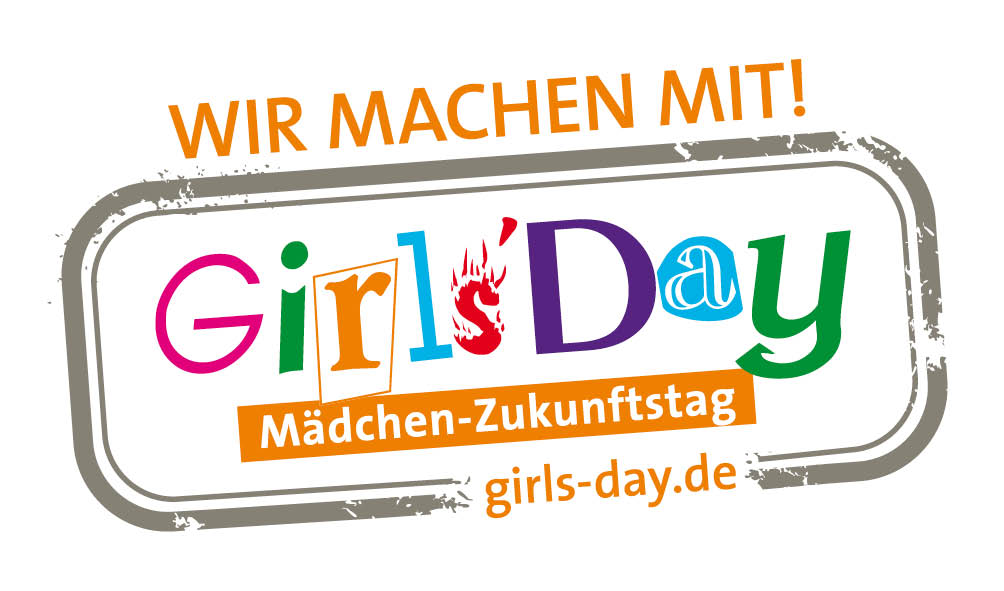
TRR PIs are very keen on promoting their research areas to children and are offering the following activities in this year's Girls' Day:
- Diana Göhringer (TU Dresden): Programmiere unseren Roboter Pepper
- Stuart Parkin (MPI MSP, Halle): Forschung hautnah: Magnetismus, Mikroskopie und Reinraum am Max-Planck-Institut für Mikrostrukturphysik
- Bernd Rellinghaus (TU Dresden, DCN): Faszination Smartphone – Mikroskopie miterlebt
- Max Lemme, Maryam Mohammadi, Zhenxing Wang (AMO, Aachen): Entdecke Technologie mit viel Zukunft: Die Nanotechnologie
- Jens Trommer (naMLab gGmbH, Dresden): Think Big - Make Nano
3rd NC-Day 2025
On behalf of the research projects NEUROTEC and NeuroSys, please be kindly invited to 3rd Neuromorphic Computing Day at Forschungszentrum Jülich.
Event Details:
- Date: May 21st-22nd 2025
- Location: Forschungszentrum Jülich
Join us for a day filled with inspiring talks, discussions, and networking opportunities centered around the latest developments in neuromorphic computing.
More information, including the agenda and registration details, will follow here shortly.
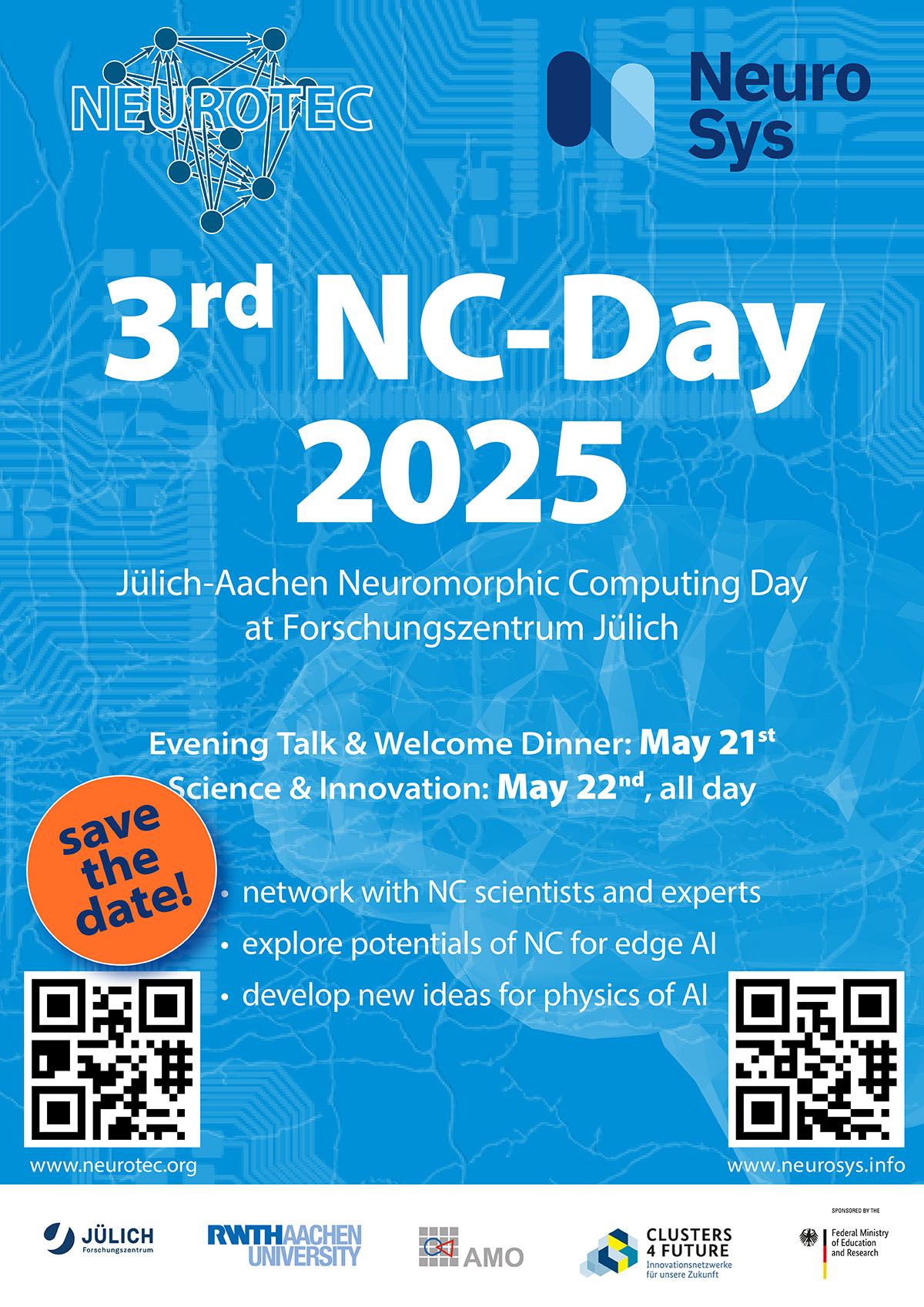
We are hiring!
We are now looking for highly motivated scientists to join our PI Team. Positions are available at all involved institutions
Please check out our vacancies here! We are looking forward to receiving your application.
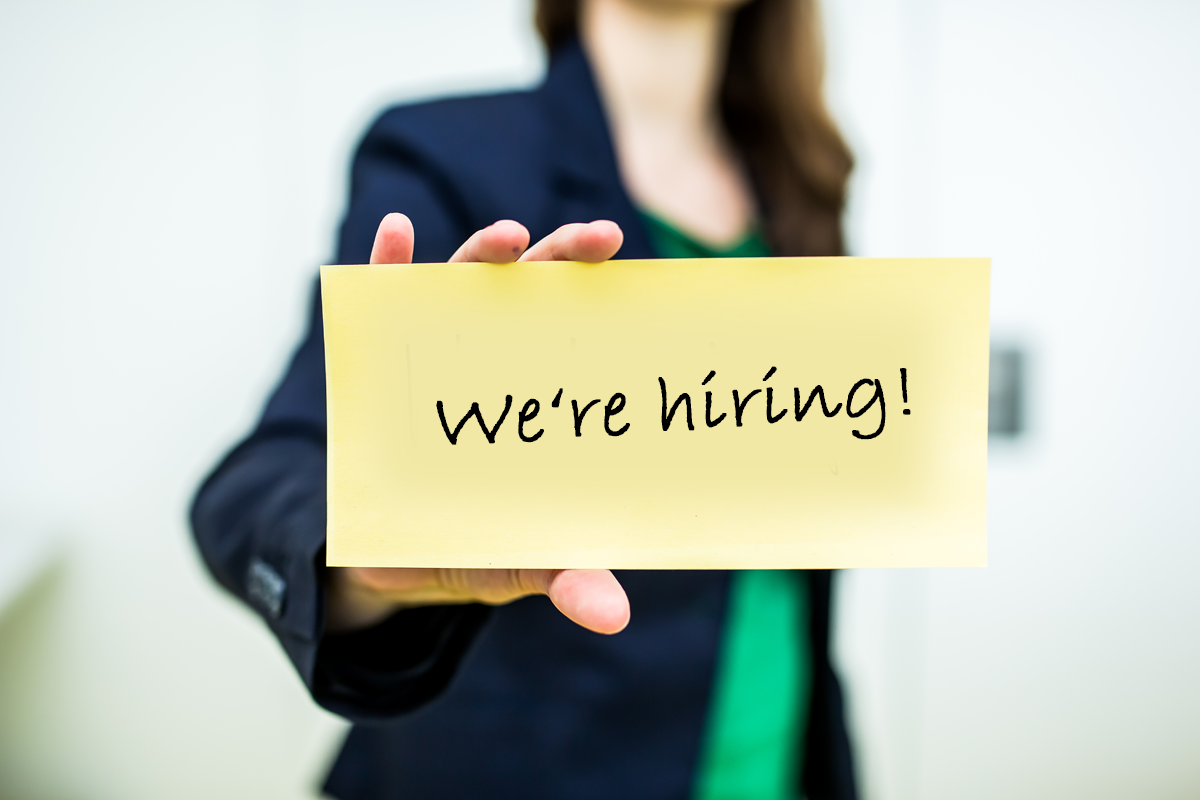
Device Research Conference 2025 (DRC) - Invited Speaker: Max Lemme
This year marks the 83rd anniversary of the DRC—the longest-running device research meeting in the world. The high-caliber technical sessions are highlighted by plenary talks and invited talks by international research pioneers and leaders behind modern electronic technology.
The TRR404 is proudly represented by one of the invited keynote speakers: Prof. Max Lemme. Prof. Lemme is the Co-Speaker of our TRR404 and will speak about his topic: 2D Devices on CMOS and Photonic Chips, Flexible Electronics.
One of the TRR's Friendly Advisors - Prof. Walter Weber of TU Wien - is also a keynote speaker at this year's DRC.
Success: TRR404 Granted
Please find more information in the first press release!





